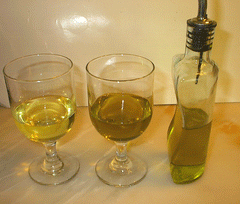Is there hexane in that veggie burger?
And do you know why hexane is used as compared to cold-processed or expeller pressed oils? Are you worried about hexane residue in your veggie burger? And as importantly, is there hexane in the oils you use to cook with or used to make your personal care products? We don't think it's a high risk in your veggie burger and the link below shows why, but we do buy and use 100% certified organic cold pressed oils and expeller pressed oils for all of our personal care products. These oils are always more expensive, 2 to 3 times for some oils and butters. We do that because these processes are done at lower temperatures and this retains the vitamins, antioxidants and other phytonutrients in the oils, not so much because we're concerned about hexane in non-organic oils. We're much more concerned about pesticide and herbicide residuals in non-organic oils. Below is some information about the different types of oil processes - things you might want to consider when purchasing your oils for cooking or your creams, soaps and cosmetics.
Why do we buy oils that are expeller pressed?
Our first choice is always cold pressed, but that's not always available in some oils. If we can't find cold-pressed for a particular oil, then we look for expeller pressed oils and butters. This is a process that does not use chemicals to extract the oil - which means, no hexane is used. Additionally, no external heat is applied in order to extract the oil. There is friction and, therefore, higher heat from the higher friction is required in some nuts or seeds that are harder and require more friction in order to extract the oil. So basically, expeller pressed means that the oil is extracted without using hexane or other chemicals. Using chemicals and high heat is a common practice for many conventional oils you find on the grocery stores and your cosmetic counters.
Why do we pay extra for cold pressed?
Well, cold pressed is just that - cold processed where temperatures are controlled to ensure that the seed or nut does not go higher than 100-120 degrees F (some are even processed as low as 80 to 90 degrees F). By cold pressing, the key nutrients, essential fatty acids and phytonutrients are left intact. Obviously, this is a more labor intensive and expensive process, but worth it we think and definitely the "gold standard" for all oils. When we add these oils to our products, we also are very careful about keeping these oils at low temperatures, as we also do when infusing our organic herbs into the oils.
Avocado oil was the one that was the most obvious to me and finally convinced me we needed to change. We previously purchased a "cosmetic" grade avocado oil and when I asked the supplier if it made a difference whether I purchased the organic or cosmetic grade, he said no. I then asked was this oil "food grade" and he said no. It was then that I knew we should be purchasing not only food-grade oils, but certified organic ones. I decided to sample some of the different oils and purchased a certified organic cold-processed, unrefined avocado oil that is a beautiful deep green, thicker, and it seems obvious to me would contain far more nutrients than could possibly be retained in a high heat process used for cosmetic grade oils and butters. The picture here clearly shows the difference, even in spite of my amateur photography. The oil on the far right is our certified organic extra virgin olive oil, the same that we use for cooking and for our creams and soaps (30% in our soaps). The oil on the far left is the cosmetic grade Avocado oil we used before we knew better, and the middle avocado oil is our certified organic unrefined avocado oil. I'm visual and this was an obvious no brainer for me. The lesser grades of olive oil are also very thin and clear in color but that is what is used in most of the cosmetics and soap on the shelves today - and, unfortunately, in a lot of the extra virgin olive oil you probably pay a lot for at the grocery store - even the health food store. Not ours. Unrefined oils are always darker in color and more true to their natural seed, nut or fruit.

The cosmetic grade oils are refined at temperatures as high as 450 degrees - these oils are not a food grade oil. Some oils are "partially refined" which can include deodorization and bleaching. And, finally, and important we think, is that certified organic oils and butters are rigorously analyzed for chemical, pesticide or herbicide residue. We do not purchase oils that have been processed through high heat extraction as these methods produce unhealthy oils - if we can't eat it ourselves, we don't use it in our products.
So what about hexane in our veggie burgers?!
The link provided below gives a good analysis of whether this is true and to what extent it should influence your purchasing habits. We do think it's important to look at the label and compare the oils you use for cooking as we believe it makes a difference in the content of vitamins, antioxidants and phytonutrients retained. Obviously, you're probably not going to know what type of oils are used in your cosmetics and other personal care products- except ours of course. And that's even assuming the product contains real oils and butters or just lots of synthetic chemicals to try to accomplish the same feel at a much lower cost - to them, not usually to you. But that's another story for another day.














Comments